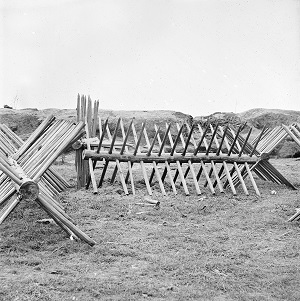Spy System 1777 
At the beginning of the Revolutionary War, the Americans had little practice with espionage, a craft already much refined in Europe. Witness Nathan Hale's brave but foolhardy attempt to spy on the British in New York City in 1776. Hale was a great patriot, but an incompetent spy, and his chief contributions to the American cause were his (alleged) inspirational dying words, "I regret that I have but one life to give for my country"
 This is Nathanael Greene.
This is Nathanael Greene.No pictures are available for Clark
(Perhaps because he was such a good spy)
By the time of the Pennsylvania Campaign of 1777, American spies had acquired far more finesse. Perhaps Hale's well-publicized death had acted as a serious warning. With the British capture of Philadelphia on September 26, 1777, and with the Continental Army opposing the invaders declining in numbers, equipment and health, General Washington needed immediate, first-hand intelligence of the enemy's intentions, movements and condition.
To supervise this vital work he sought a man of intelligence and discretion, familiar with the local populace and territory. The General's choice fell on General Nathanael Greene's aide-de-camp, Major John Clark Jr. of Pennsylvania.
Extracts taken from the correspondence between Clark and Washington during the latter part of 1777 illustrate the excellence of the corps of spies enlisted by Clark, and the sharp perception and determined perseverence of Clark himself.
Clark's first communications to Washington commenced some thirty miles to the west of Philadelphia, from the Red Lion Tavern (now Lionville) in Uwchlan Township, Chester County on October 6. These communications, directed to Washington at his camp at Pawling's Mill, principally concerned reports on the recent (October 4) Battle of Germantown, bringing welcome news of British defeats and setbacks.
The first letter confirmed the death of British Brigadier General James Agnew as the result of wounds received in the late battle, and that one or two other generals were also mortally wounded. The letter also noted the heavy casualties suffered by the British, and informed Washington of the deployment of enemy forces:
. . . it was the current report in the City, that the Rebels had used the British Troops barbarously-several Quakers from the City say that upwards of two hundred Waggons came in before they left it, with wounded Soldiers-A few Days ago a number of Waggons went towards Chester, 'tis thought for Provisions-whether the Troops that crossed Yesterday went to escort them-or to establish a Post at Derby or Chester, to secure their retreat, I submit to your Wisdom

Cheveaux de frieze
Click for more information
Just a few hours later, Clark sent another letter, reporting the fall of the American fort at Billingsport, on the New Jersey side of the Delaware River south of Philadelphia. Clark notes that the British were trasporting their heavy cannons, successfully bypassing the cheveaux de frieze which the Americans had sunk in the river to prevent British ships access to Philadelphia. Clark goes on to report:
Provisions are scarce with them-Gen. Howe has ordered the Inhabitants to patrole every Night through the City-Mr Chews House shot to pieces-my friend says hes never saw such shocking sights-all the Troops were in action except a few Guards-he ads if the Troops had arrived at the middle Ferry earlier 'twou'd have prevented the Enemy's reinforcement from the City joining the main body People go & come as usual into the City from this County – If a few Troops were sent down the Schuylkill it wou'd prevent — I am further informed the number of prisoners taken amounts to about 400 – the Enemy's Waggons are constantly going towards Chester.





